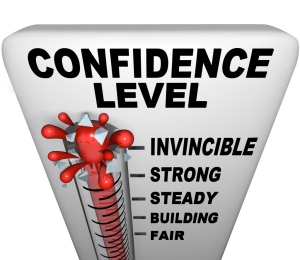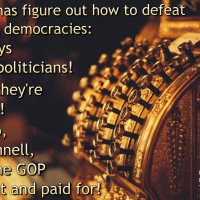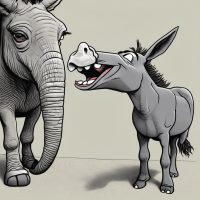Tomorrow, Monday 27 September, during MONDAY NIGHT FOOTBALL!!1!, the two most popular presidential candidates are going to DEBATE!!1! We are all going to hear the words that they say, see their postures, and feel our feelings. Then we’re going to hear other people say their words about the words the candidates have said, the postures the candidates have taken, and the feelings that we all should be having. And, in the midst of all of this, we will be reading the words that people have written about the words that the candidates and talking heads and other social media commenters have used, their postures, and feelings.
Clinton’s Reputation
During the past terrible, horrible, no good, very bad week we have heard a lot about transparency and its ugly step-child, dissembling. Okay, no one is saying dissembling, but they’re thinking it! I can guarantee. As of today, it really seems like ancient history, but on 11 September 2016, Clinton experienced some weakness related to having pneumonia. She was soundly criticized for having disappeared for 90 minutes and needing eight hours to announce that she had been diagnosed with pneumonia two days earlier. How the earth continued turning on its rotational axis is beyond me, but apparently it caused many much consternation and gnashing of teeth. As I understand it several reporters developed boils in that time and appeared on national TV rending their clothing and scraping their skin with broken pottery.
- Transparency is a feeling of having adequate knowledge and understanding of a situation involving another, especially a situation of some importance. It is akin to dishonesty and deception, but it is not necessarily dishonest or deceiving.
- Dissembling to give a false or misleading appearance to; conceal the truth or real nature of; to conceal one’s true motives, thoughts, etc., by some pretense; speak or act hypocritically.
Trump’s Reputation
The Los Angeles Times reported that 70% of all of Trump’s statements have been rated as mostly false, false, or pants-on-fire false. That’s unprecedented. In contrast, Clinton’s statements have been 28%. That actually makes her one of the most honest politicians active today.
Never in modern presidential politics has a major candidate made false statements as routinely as Trump has. Over and over, independent researchers have examined what the Republican nominee says and concluded it was not the truth — “pants on fire” (Politifact) or “four Pinocchios” (Washington Post Fact Checker).
Yet, the reputation of the candidates is the exact opposite: Clinton lacks transparency and is very dissembly, while Trump is considered more honest and transparent! How will we perceive the debate? Can science explain that? Why yes. Yes, it can.
Determinants of Confidence
 When we make decisions, choices, or simply predict the future, we use a set of information, impressions, and some kind of logic or at least what passes as logic. The editorial here at the Psy thought it would be a good idea to examine the ways we use information or the lack of it to make decisions and form beliefs so that I might continue gargling with Listerine and stop eyeing the lead-glass of battery acid as I am tempted to do to cope with the sheer awfulness of our headlong descent into being the United Fucking States of Fucking Stupid.
When we make decisions, choices, or simply predict the future, we use a set of information, impressions, and some kind of logic or at least what passes as logic. The editorial here at the Psy thought it would be a good idea to examine the ways we use information or the lack of it to make decisions and form beliefs so that I might continue gargling with Listerine and stop eyeing the lead-glass of battery acid as I am tempted to do to cope with the sheer awfulness of our headlong descent into being the United Fucking States of Fucking Stupid.
One of the chiefest problems with a lack of transparency and suspected dissembling is that people will fill-in the blanks. Nature hates a vacuum even an immaterial vacuum formed in the abstract universe of thought.
Amos Tversky, Daniel Kahneman, and other behavioral economists consider several useful factors when examining how people use information to answer questions. I’m relying mostly on Dale Griffin and Amos Tversky’s chapter, The Weighing of Evidence and the Determinants of Confidence from Heuristics and Biases: the Psychology of Intuitive Judgment. So, let’s review a few of these before moving on:
- Confidence is the behavioral economics term used to describe the degree of belief in a given hypothesis or conclusion. A hypothesis is a prediction of a specific future event based on specific information. So, like it or not, we are indeed naive psychologists as Fritz Heider suggested or naive scientists as George Kelly thought; we just aren’t very good at either.
- Strength is the term used to describe how convincing the evidence is other ways of describing this concept is as strength of claim or extremeness. The more extreme, the more convincing, although this is not a straightforward one-to-one relationship.
- Weight is the term used to describe the predictive validity or credibility of the information. The more predictive the information, the more weight we give it in evaluating a hypothesis.
These concepts combine in interesting ways that affect our beliefs and decisions. Strength and weight can be combined in four basic ways if we rate each as either being strong or weak.
- High strength combined with low weight results in overconfidence
- High strength combined with high weight results in some confidence
- Low strength combined with low weight results in some confidence
- Low strength combined with high weight results in underconfidence
With over and underconfidence being the most interesting and applicable. Okay, interesting to me. And maybe Suze. If it is interesting to you, let me know in the comments, will ya? Or even if it is tolerable or even if you hate it. Or even if you just accidentally hit the comment button and have the cat walk across the keyboard go ahead and post. No explanation needed.
The Equation
 Here’s where things get really interesting — I know, I know, for who? But, still — knowledge can come to us from several sources. Most basically from the environment or from our own imaginings depending on how we combine pieces of information either remembered or drawn from the environment and reason and react to it. In this sense, we can talk about limited or abundant knowledge and how that affects our confidence.
Here’s where things get really interesting — I know, I know, for who? But, still — knowledge can come to us from several sources. Most basically from the environment or from our own imaginings depending on how we combine pieces of information either remembered or drawn from the environment and reason and react to it. In this sense, we can talk about limited or abundant knowledge and how that affects our confidence.
- Limited knowledge combined with strong impression results in overconfidence
- Abundant knowledge combined with moderate impression results in underconfidence
Not what I was predicting, were you? See, didn’t I tell you it was interesting? Ha! Who’s bored now? One assumes that limited knowledge and moderate impression results in no confidence and abundant knowledge and a strong impression, an accurate level of confidence. Those aren’t so interesting because intuition, amirite?
Time to quit torturing y’all with this academic claptrap and cut to the chase.
The Opaque Dissembler
 What does this tell us about Clinton and our views of her transparency and dissembling? How will it affect our interpretation of her debate performance? Put another way, those of the electorate who describe Clinton as being opaque — okay, so no one describes a lack of transparency as being opaque, but it is, isn’t it? — or being a shameless dissembler, that’s the nice term for the way these people usually describe her. Wouldn’t opaque dissembling be a great name for a symphony or the Clinton biographical opera? Would Hillary be a soprano or alto? Again, feel free to discuss in the comments.
What does this tell us about Clinton and our views of her transparency and dissembling? How will it affect our interpretation of her debate performance? Put another way, those of the electorate who describe Clinton as being opaque — okay, so no one describes a lack of transparency as being opaque, but it is, isn’t it? — or being a shameless dissembler, that’s the nice term for the way these people usually describe her. Wouldn’t opaque dissembling be a great name for a symphony or the Clinton biographical opera? Would Hillary be a soprano or alto? Again, feel free to discuss in the comments.
Put even another way, we can ask, Why is Clinton’s support so weak? She’s got somewhere between 40 and 48% of the vote. It is enough to win, but not to win big. Not to win convincingly. Not to win with coat tails.
Republicans, Democrats, conservatives, liberals, and progressives who are super against Clinton have a strong impression of Clinton: corrupt, dishonest, self-serving. This impression is based on limited inaccurate knowledge. They think they have extensive knowledge, but they don’t. They have impressions not data.
I know we cannot put our differences aside here, but if we are honest with ourselves in the deepest darkest part of our soul, we will have to acknowledge that the allegations against the Clintons have been fast and furious, but the indictments and convictions few and far between, especially where Hillary is concerned. Even the highly partisan Benghazi committee chaired by that weaselly whiny opaque dissembler, Trey Gowdy (R – Pasty White Repulsiveness), was forced to release its report not as the long hoped for October surprise to derail Clinton’s candidacy but in July 2016 just in time to be completely forgotten but so that the shrill hysterical accusations can continue.
For the love of god, any honest human being has to admit that the Clintons have been the most investigated politicians in the history of human kind with bupkis coming out of it. If there were something there, it would’ve been found. Just ask Ken Starr and Colin Powell — the weenie for hiding his opinion on Benghazi in private emails and not on the front page of the New York Times. Can we all just agree on that? If you can’t, don’t you comment otherwise cause I’ll delete that lying trolling crap faster than you can say First fucking Amendment.
The people whose support is tepid have extensive information but don’t commit. They think Clinton is probably a capable public servant, but maybe she isn’t. Their confidence is eroded by the mediocrity of the strength of their conviction. It is the universal, MEH?
The thirty year smear campaign against the Clintons — funny how Bill has been left out of it completely now that he is no longer an active politician — is effective because of the AVAILABILITY HEURISTIC. The availability heuristic is the decision making algorithm in which the most easily accessed information from memory is accepted unquestioningly and decisions based on it. When we think of the Clintons, the Republicans have successfully engineered it that we all think of scandals, lies, and dishonesty.
 When people are asked to evaluate a hypothesis, they do not use a probability and statistics to combine the strength and weight of evidence, instead, they use an intuitive goodness of fit judgment in which the evidence is matched to the hypothesis. Thus, Hillary Clinton is a no good dirty opaque dissembler so her claims of being healthy enough to be president must mean she is at death’s door, is rated as correct with a high degree of confidence because it seems to match with our impression of Clinton’s overall honesty. Of course an opaque dissembler is not going to be truthful about her health and cover up signs that she is unhealthy. Of course.
When people are asked to evaluate a hypothesis, they do not use a probability and statistics to combine the strength and weight of evidence, instead, they use an intuitive goodness of fit judgment in which the evidence is matched to the hypothesis. Thus, Hillary Clinton is a no good dirty opaque dissembler so her claims of being healthy enough to be president must mean she is at death’s door, is rated as correct with a high degree of confidence because it seems to match with our impression of Clinton’s overall honesty. Of course an opaque dissembler is not going to be truthful about her health and cover up signs that she is unhealthy. Of course.
Strength of information is defined as its convincingness. And, people tend to be over reliant on the strength of evidence and ignore other determinants. When there are unknowns, like what was Clinton doing at her daughter’s house for 90 minutes on 11 September — a scandal that dwarfs the terrorist attacks (or is that too soon?) by millions of lumens — Really? She was probably getting a transfusion since she was dehydrated, but who knows? When we have a blank in the narrative to fill-in, we turn to the availability heuristic, i.e. the most easily accessed related memory, to make our determination. The Clinton is an opaque dissembler narrative is a very convincing, i.e. very strong, piece of evidence that leads us to accept the worst explanation and view all actual explanations with suspicion.
We are very confident of our conclusion based on the strength of our impression of Clinton’s honesty and our limited information on what did happen.
People do not combine strength and weight by using probability and statistics; they use an intuitive judgement according to how well the evidence they have matches the hypothesis. The tendency is to use the strength of the known or preferred evidence and then adjust the weight. This over reliance on the strength of information diminishes the use of other predictive variables. Other than environmental sources of information, people will use the availability heuristic to fill-in the blanks making priming extremely influential on decisions requiring predictions.
Trump’s Delusional World
Trump’s reputation is a little more complex to understand and interpret in large part because we haven’t had a systematic thirty year effort to shape that reputation! Okay, Trump has been working at it, but it hasn’t been near as successful as the Clinton smear campaign — Ain’t it deplorable that Democrats, liberals, and progressives have bought into it so wholeheartedly?
People actually think Trump is a successful business guy! They think he is a philanthropist! He’s a philanderopist, but he’s no philanthropist! They think he’s honest! They think he’s a negotiator! Holy fucking living a delusion! Let’s remember the rule:
Limited knowledge combined with strong impression results in overconfidence
We have limited knowledge because we haven’t seen his tax returns. His tax returns would tell us about his businesses and his philanthropy, and probably on his philandering, too. Let that sink in. He has carefully controlled the information we have about him. No tax returns. Shifting focus onto the opponent when any question has been posed about his business practices — 3500 lawsuits? — his honesty — crooked Hillary, Lying Ted.
He’s also created a strong impression by manipulating the press throughout his career — publicist, John Miller, anyone? The Art of the Deal, and The Apprentice. He makes direct statements about himself — I’m the best at negotiations! I have made billions! I will win so much you’ll be sick of winning! And, people believe it. They may not have believed it when they heard it, but it is repeated often enough that the memory of the words separates from the circumstances that it was encountered in.
These two things combine to produce a very confident albeit incorrect interpretation of Trump as being successful and straightforward.
The Outcome
Unless there is an incident during the debate that changes the balance of the equation so that we work with more information or that our impression is challenged, it will not change the confidence we have in our beliefs about either one of these candidates. Knowing not only the results of how information and impressions are combined and how that information is accessed (availability heuristic) and how impressions are formed can help both candidates manipulate their performance in the debate, but also, how we interpret their performance. It can help inoculate us against these cognitive tendencies.
Categories: Behavior Economics, Determinents of Confidence




















I’m just a bit curious…work with me here,,,,,,, If Trump were a female how would he be received ,… and if Hilary were a male how would her perspective be received….. just some thoughts to ponder and evaluate how that would change the perspective of each…..and their reception by the voters,,,,,,,hmmmmmmmmm
LikeLike
Maybe I am odd, but I am not at all thrilled about this election as I have seen so much mud slinging and honestly…neither candidate represents what every voter, in my opinion, should be concerned about…their views. Neither Trump nor Hillary really have a grasp of what is important to me…then I guess that is politics. You made a valid point in terms of impressions and how much they can sway votes. That is very true.
LikeLiked by 1 person
Howdy Burresor!
It must be very disappointing to have neither candidate come even close to what is important to you. However, there are other ways of evaluating a presidency, namely, how much of their agenda were they able to enact. Reagan was able to enact a substantial amount of his agenda, which makes him successful regardless of agreement with his political positions. There is wide latitude that can be given in terms of effective policies. There is little relative distance between Republican and Democratic positions compared to non representative democratic governments. So, one way to decide who to vote for — not that you haven’t; I don’t know — is to ask yourself who would be able to enact their policy and legislative agenda?
Huzzah!
Ja
LikeLiked by 1 person
Well said!
LikeLiked by 1 person
At first I was startled to see population dynamics in your algorithms but then the light bulb came back on..it’s always easier to see in a lighted room you know. And actually I have always thought that high strength combined with high weight results in some confidence is the most fascinating…it is such an odd result that I actually admire it for its strangeness. The pundits are already pontificating, and it is only 7 am! The consensus seems to be that no matter what Hillary says she won’t make a good impression, because, you know. “The Donald’s” questions are oh so much shorter than Hils are and that seems to be causing some consternation. I will be watching tonight with baited breath and a notebook in which to keep score. (I do find all this fascinating for some oddball reason)
LikeLike
Howdy Suze!
I find it all fascinating, too. This year is the most amazing election ever! I just hope it doesn’t end with us all dying on the same day.
The one voice that I find most worthwhile is the co-author of “The Art of the Deal.” He is one of the few people who had to work with Trump for an extended period of time where Trump had to make a significant contribution of time and effort.
His evidence sounds pretty genuine or convincing and credible — high strength and high weight — so I’m very confident that his description is the accurate one.
Huzzah!
Damby! I wish I’d put that in the article.
LikeLiked by 1 person